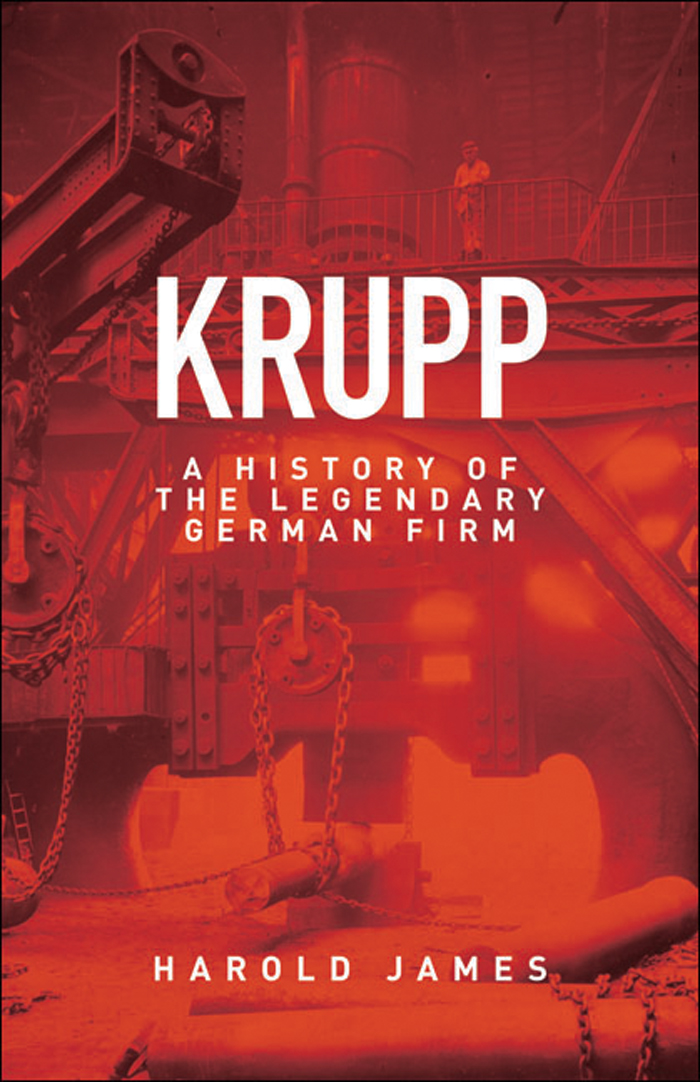Fried. Krupp GmbH - Krupp: a history of the legendary German firm
Here you can read online Fried. Krupp GmbH - Krupp: a history of the legendary German firm full text of the book (entire story) in english for free. Download pdf and epub, get meaning, cover and reviews about this ebook. City: Germany, year: 2017, publisher: Princeton University Press, genre: Politics. Description of the work, (preface) as well as reviews are available. Best literature library LitArk.com created for fans of good reading and offers a wide selection of genres:
Romance novel
Science fiction
Adventure
Detective
Science
History
Home and family
Prose
Art
Politics
Computer
Non-fiction
Religion
Business
Children
Humor
Choose a favorite category and find really read worthwhile books. Enjoy immersion in the world of imagination, feel the emotions of the characters or learn something new for yourself, make an fascinating discovery.

- Book:Krupp: a history of the legendary German firm
- Author:
- Publisher:Princeton University Press
- Genre:
- Year:2017
- City:Germany
- Rating:4 / 5
- Favourites:Add to favourites
- Your mark:
- 80
- 1
- 2
- 3
- 4
- 5
Krupp: a history of the legendary German firm: summary, description and annotation
We offer to read an annotation, description, summary or preface (depends on what the author of the book "Krupp: a history of the legendary German firm" wrote himself). If you haven't found the necessary information about the book — write in the comments, we will try to find it.
Krupp: a history of the legendary German firm — read online for free the complete book (whole text) full work
Below is the text of the book, divided by pages. System saving the place of the last page read, allows you to conveniently read the book "Krupp: a history of the legendary German firm" online for free, without having to search again every time where you left off. Put a bookmark, and you can go to the page where you finished reading at any time.
Font size:
Interval:
Bookmark:

KRUPP
A HISTORY OF THE LEGENDARY GERMAN FIRM
HAROLD JAMES
Princeton University Press Princeton & Oxford
COPYRIGHT 2012 BY THE KRUPP FOUNDATION
REQUESTS FOR PERMISSION TO REPRODUCE MATERIAL FROM THIS WORK
SHOULD BE SENT TO PERMISSIONS, PRINCETON UNIVERSITY PRESS
PUBLISHED BY PRINCETON UNIVERSITY PRESS,
41 WILLIAM STREET, PRINCETON, NEW JERSEY 08540
IN THE UNITED KINGDOM: PRINCETON UNIVERSITY PRESS,
6 OXFORD STREET, WOODSTOCK, OXFORDSHIRE 0X20 1TW
PRESS.PRINCETON.EDU
ALL RIGHTS RESERVED
Library of Congress Cataloging-in-Publication Data
James, Harold, 1956
Krupp: a history of the legendary German firm / Harold James.
p. cm.
Includes bibliographical references and index.
ISBN 978-0-691-15340-7 (hardcover : alk. paper) 1. Fried. Krupp GmbHHistory. 2. Krupp familyHistory. 3. Steel industry and tradeGermanyHistory.
I. Title.
HD9523.9.F697J36 2012
338.7'6691420943dc23
2011024639
BRITISH LIBRARY CATALOGING-IN-PUBLICATION DATA IS AVAILABLE
THIS BOOK HAS BEEN COMPOSED IN BERLING AND DIN
PRINTED ON ACID-FREE PAPER.
PRINTED IN THE UNITED STATES OF AMERICA
1 3 5 7 9 10 8 6 4 2
Risk: Friedrich Krupp
Steel: Alfred Krupp
Science: Friedrich Alfred Krupp
Diplomacy: Gustav Krupp von Bohlen und Halbach I
Tradition: Gustav Krupp von Bohlen and Halbach II
Power and Deglobalization: Gustav and Alfried Krupp von Bohlen und Halbach
Reglobalization: Alfried Krupp von Bohlen und Halbach and Berthold Beitz
I should like to thank the Alfried Krupp von Bohlen und Halbach-Stiftung (Foundation) for financial support for the research involved in producing this book. Professor Berthold Beitz, the chairman and executive member of its board of trustees, kindly received me for some agreeable conversations. I had full access to the important historical archive of the company and the family, beautifully housed in a wing of the Villa Hgel in Essen, the historic home of the Krupp business dynasty. Especially I should like to thank Dr. Ralf Stremmel of the Krupp archive for his invaluable assistance in locating archival and pictorial material. Dr. Detlef Felken and Dr. Stefanie Hlscher of the Beck Verlag Munich and Brigitta van Rheinberg of Princeton University Press have assisted with their customary care and acumen. In addition, this book reflects insights that I have been developing in the course of working on a European Union research project on corporate governance and family firms (MEXC-CT-2005-024362). The resulting book reflects solely the views and interpretations of the author.
Princeton, New Jersey, September 2011
Alfred Krupp made the name Krupp into a German icon. For him, it was not a coincidence that the dramatic period of expansion of the small enterprise that his father had established in 1811 coincided with the creation of the German Empire. He proudly announced to Wilhelm I, the new emperor, that they were now living in the steel age. Kaiser Wilhelm I and Bismarck were both quick to see and confirm the parallels between the new politics and the new business. But the identification between the house of Krupp and the German political order did not stop with the death of Krupp in 1887 or of Wilhelm I in 1888. Krupps son, Friedrich Alfred, cultivated an even closer relationship with Wilhelm Is grandson, Kaiser Wilhelm II. The new business culture reflected the kaisers own search for modernity and greatness. For Adolf Hitler, Krupp was also an icon. In Mein Kampf and again in 1935 at the Nuremberg party rally, Hitler exhorted German youth to be as quick as a greyhound, as tough as leather, and as hard as Krupp steel.
On the eve of the First World War, Krupp had been by far the largest German company, with assets of 599.5 million marks in 1912, although it was only one-fifth the size of the largest American corporation, the giant U.S. Steel, and half the size of the largest British firm, the thread and textile maker J. & P. Coats. Its owner, Bertha Krupp von Bohlen und Halbach, was listed as being, with assets of 283 million marks, the wealthiest person in Germany (the kaiser was only the fifth richest). By 1937 it was still the fourth-largest German firm in terms of market capitalization (behind the steel giant Vereinigte Stahlwerke, IG Farben, and Siemens) and the forty-eighth largest In 2005 ThyssenKrupp was in 85th place on the Fortune Global 500 list (ordered by revenue) and in 2010, 123rd place.
Krupp seemed to stand for a particular German way of doing business. Later analysts called this Rhineland capitalism. It involved several distinctive elements that were blended together into an astonishingly durable and successful synthesis of business culture: a commitment from the beginning to export orientation (an embrace of what we would today call globalization); a close relationship with the state, as a regulator, as a purchaser of industrial products, and as a source and guarantor of credit; a long-term commitment to a skilled workforce that was tied to the enterprise by material inducements but also by a sense of loyalty to a factory community rather than just to an owner; suspicion of capitalists, financiers, and stock markets (even though banks played a prominent part in the financing of much of German heavy industry); and also suspicion of the principle of competition. Instead, the business model relied on obtaining absolute preeminence in a well-defined market for a number of specialized and skilled products. We would speak today of niche markets. But these niche markets were scaled up in the course of the nineteenth century and of German industrialization, so that the niches expanded to fill the world.
What drives a company? To assume that the motive force is simply a rational search for profit is endlessly naive. There are alternative visions of the ultimate purpose of business and of the motivation of owners, managers, and workers. Is the driving impulse service to the nation? Is it the link to political power? Is it a question of the psychic satisfaction of the owner or the leading managers? Is it an idea about innovation? Is it a functioning within a network of trust and relationships? All these answers have been given to explain the alleged peculiarity of continental European capitalism.
Some of the major themes of the subsequent development of the Krupp company (and which are at the heart of the analysis of this book) emerged in the nineteenth century and were then hardwired into a corporate culture that became a sustaining vision: first, the absence of an exclusive focus on profitability. The idea that business was not just about the accounting result was eventually institutionalized in the concept of a foundation (Alfried Krupp von Bohlen und Halbach-Stiftung) as owner of the company, rather than anonymous shareholders or even a large and dispersed family. Thus, at the same time as the student revolution of the late 1960s swept Germany, the Krupp enterprise ceased to be a family business. But the notion of a mission that went beyond profitability had its origins in an extraordinary nineteenth-century story in which for its first twenty-five years the company lost money. Such sustained unprofitability is unfamiliar in the age of modern capital markets, though some technologically dynamic companies do survive in stock market valuations for some time without showing profits, and only on the basis of potential. The early nineteenth century had a deeper answer that still holds true in many major emerging market economies, namely, that a network of family and friends, usually tied in with kinship links, can sustain an idea that they believe in for a very long time. But in reading the early story of Krupp, one must bear in mind that almost any modern company following that trajectory would not survive for the time Krupp needed to become a profitable enterprise: it would simply fizzle and die.
Font size:
Interval:
Bookmark:
Similar books «Krupp: a history of the legendary German firm»
Look at similar books to Krupp: a history of the legendary German firm. We have selected literature similar in name and meaning in the hope of providing readers with more options to find new, interesting, not yet read works.
Discussion, reviews of the book Krupp: a history of the legendary German firm and just readers' own opinions. Leave your comments, write what you think about the work, its meaning or the main characters. Specify what exactly you liked and what you didn't like, and why you think so.




